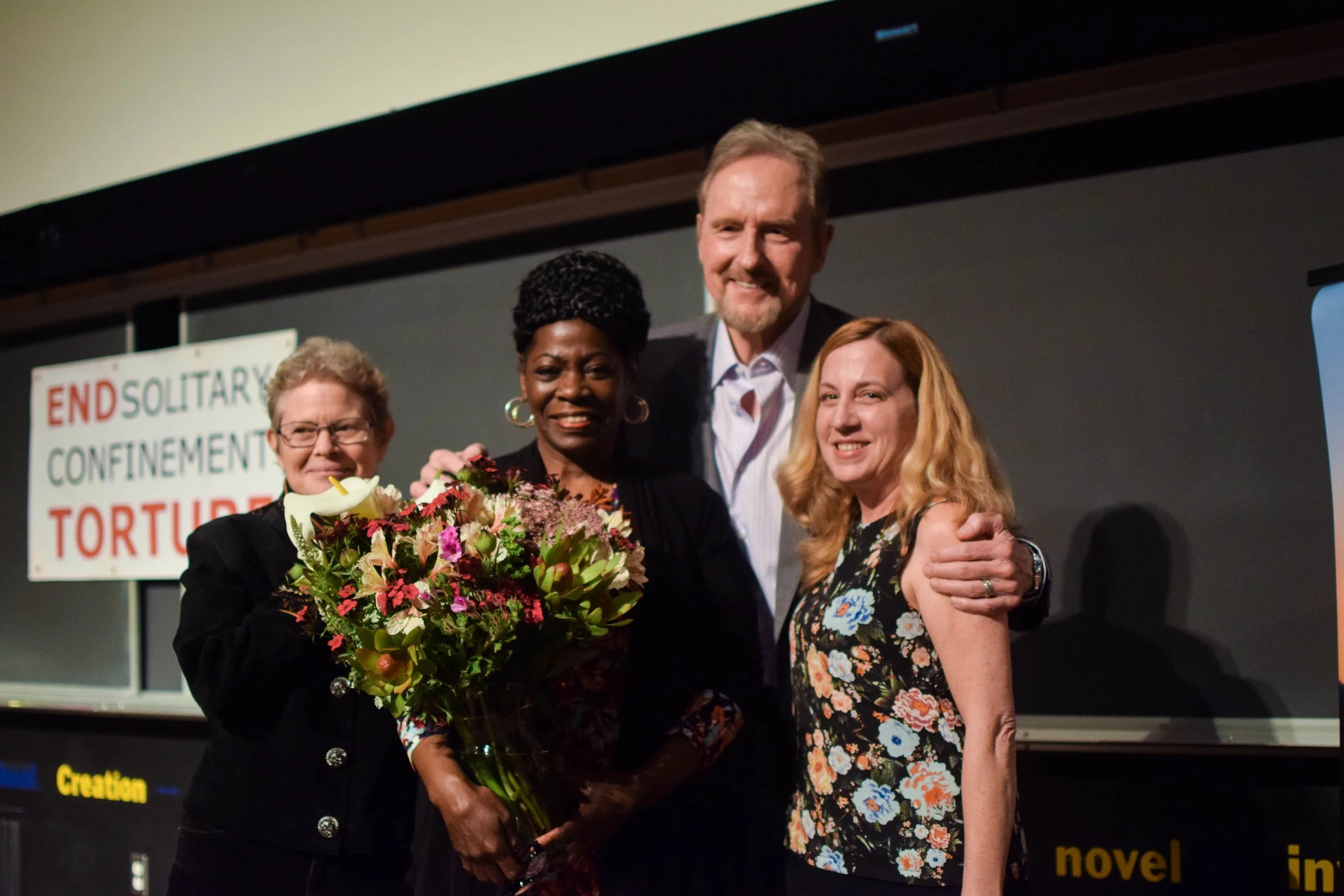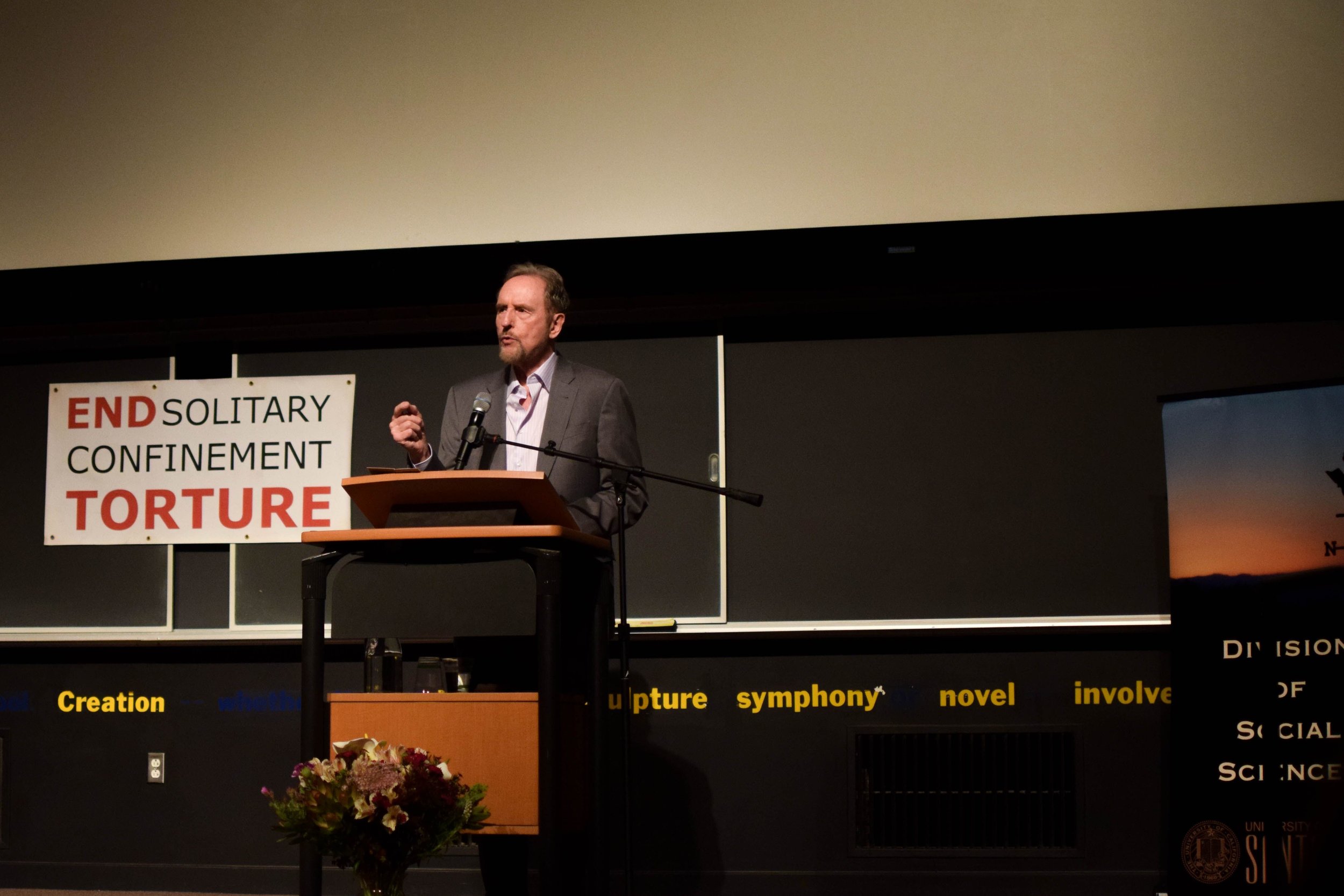On April 22, 2018 over 200 people attended the UCSC opening of the Reel Work May Day Labor Film Festival (RWLFF)’s 17th season, with the event theme Together to End Solitary. RWLFF celebrates working together to improve the conditions of our lives, and focuses on work: waged, unwaged, and the slave labor of incarcerated and convicted people, legalized by the 13th Amendment.
RWLFF’s motto “We are stronger together” is particularly poignant when coming together to end the extreme isolation of the state-sanctioned torture of solitary confinement.
The free event was co-hosted by California Families Against Solitary Confinement, End Solitary Santa Cruz County, and UC Presidential Chair Craig Haney. The UC Santa Cruz Legal Studies Program and a number of community organizations co-sponsored.
The film, Cruel and Unusual-the Story of the Angola 3, documents the story of the Angola 3, 3 men put in solitary confinement for organizing against abusive conditions, and organizing a chapter of the Black Panther Party for Self-Defense, inside Angola Prison in Louisiana. Collectively, the Angola 3 served 114 years in solitary confinement. The film details their decades-long struggle for justice and to build an international movement to end solitary confinement.
The first speaker, Dr. Haney, UCSC Distinguished Professor of Psychology and Law, has been an expert witness in numerous lawsuits on behalf of incarcerated people, including the Angola 3’s civil lawsuit against Louisiana’s use of long-term solitary confinement, the Ashker V. California Governor lawsuit on behalf of prisoners who spent a decade or more in California’s Pelican Bay State Prison Security Housing Unit (SHU), and the January 2018 Canadian ban on federal indefinite solitary confinement.
Dr. Haney said of the film Cruel and Unusual-the Story of the Angola 3: “I’m not sure I’ve seen a film that made me simultaneously as despairing, as angry, and as inspired as that film.”
Dr. Haney said we knew in the 18th century that solitary confinement destroyed people’s souls and we stopped using it, that its use in the last 40 years of the era of mass incarceration will be looked on as a dark age.
Haney said: “… the possible harms of solitary confinement…the signs and the symptoms of suffering…are profound…but solitary confinement has the capacity to do something even deeper. It has the capacity to change what you think about yourself. It has the capacity to change whether you even think you have a self. I’ve had prisoners tell me in solitary confinement that they sometimes are not sure they still exist…”
He emphasized: “You know that this is a story not about how solitary confinement destroys you, but actually a film about how it tries to destroy you and about how some people have figured out a way to transcend, to overcome…How did they do it…They connected to each other, they were the Angola 3 not the Angola 1, and Herman and Robert and Albert depended on and cared for and connected to and loved each other. And then they went beyond loving each other to reach out to other people. You heard them say on the radio broadcast that was quoted in the film, “It's the Angola 3 reaching out to you from the belly of the beast” and that's what they learned how to do. They connected to each other and drew strength from other and then they drew strength from the larger group of people that surrounded them, and they connected to them, and then of course they held on to their self by becoming selfless. They cared not about themselves; they cared about issues and movements and things larger than themselves and they still do…”
The next speaker, Marie Levin, is a minister and organizer with California Families Against Solitary Confinement, Essie Justice Group, the National Lawyers Guild San Francisco Prisoner Advocacy Network, and Prisoner Hunger Strike Solidarity Coalition.
California Department of Corrections labeled Marie’s brother, Sitawa Nantambu Jamaa, as a gang member of the Black Guerrilla Family, and put him in solitary for 31 years for reading a book by BGF’s co-founder, Black Panther George Jackson. A high CDC official told Marie in private that they knew that the Black Guerrilla Family is a political organization, not a gang.
Sitawa Nantambu Jamaa was a leader of the non-violent California Prisoner Hunger Strikes, helped draft the Agreement to End Hostilities, and is one of four plaintiffs who are principal negotiators for the Ashker v. Brown lawsuit, challenging conditions in California’s solitary units and general prison population.
Marie said: “Watching this incredible film there were so many parallels in the film in regards to my brother…he was in solitary confinement for thirty-one years, in prison for 37, and still in prison right now. When I first got the opportunity to watch the film…I was brought to tears in many sections of the film because I related to it. The first thing I related to was the sister who was saying that's not my brother, you don't know my brother, he's never killed anyone, and the same thing for me, my brother hasn't killed anyone. He went to prison for a crime that he did not commit. …The person that committed the crime admitted to it on the witness stand, and he got out after five years, but because of my brother's political beliefs, as with the Black Panthers, and…being labeled a gang member, he had a George Jackson book. This is a book that they used to allow in the prison…but then they used it against him…”
“He was at Pelican Bay. …that was another thing that was in the film, they house them all in one place, the political prisoners and the gang members…they learned to work together with one another, they realized that they were the prisoner class…There were four main representatives who started the hunger strikes…these guys got together and formed the Agreement to End Hostilities. …During the film that was something that…I thought about with the Black Panthers, how they formed that bond and it was the unity that drove them…that kept them together…”
Marie Levin put out a call for support to end solitary confinement, win her brother's freedom, and grow her small Oakland, CA business, MOMM's Pastries, in order to employ formerly incarcerated people at livable wages.
After the film, audience members signed our email list and postcards and petitions to the California Department of Corrections, Governor, and Legislature. We called for people to join us on the 24th of every month to build the movement to end solitary confinement, and people congregated at literature tables and a reception with refreshments.
The U.S. Constitution’s 8th Amendment is supposed to protect against cruel and unusual punishment. Solitary confinement in the U.S. is cruel and is torture, but is not unusual. There are up to 100,000 people in solitary in U.S. prisons, plus untold numbers in jails, juvenile facilities, and immigration and military detention centers. According to the UN, over 15 days in solitary is torture. The U.S. tortures more people in solitary, for longer periods of time, than any other governmental body in the world. And the California Department of Corrections (CDC) is the worst of the worst.
The CDC held Hugo Lyon Antonio "Yogi Bear" Pinell in solitary confinement for 45 years and 10 months, to our knowledge longer than any other person in the U.S. Pinell organized with George Jackson and others inside the walls for racial unity of the prisoner class, setting a historical precedent for the 2012 California prisoners’ Agreement to End Hostilities between ethnic and geographic groups.
The Agreement laid the basis for over 30,000 people to unite in the 2013 third CA Prisoner Hunger Strike, and helped lead to the 2015 settlement of the lawsuit, Ashker v. California Governor, and the transfer of over 1500 people out of Security Housing Units (SHU’s).
After the 2013 Hunger Strike, leaders inside called for supporters to hold monthly rallies to support prisoners’ rights and the Agreement to End Hostilities. This was a catalyst for the Statewide Coordinated Actions to End Solitary Confinement initiated in California on March 23, 2015, which later developed into Together to End Solitary nationwide.
In 2018 California changed the date to the 24th, since some prisoners associate the number 23 with the letter w and white supremacy. We oppose white supremacy and recognize that people in solitary are held without meaningful social contact 24 hours per day.
While we knew intellectually the numbers in solitary confinement, we are pained when every month we personally meet people who have been in solitary or who have family members currently or formerly in solitary. This widespread torture is heartbreaking and appalling, and must be stopped.
As Marie Levin has said: "We will be with the prisoners in the courts, in the legislature, and out in the community. We will use every venue available to us, UNTIL THE TORTURE IS ENDED."
Watch a video of the discussion here (Cruel and Unusual-the Story of the Angola 3, Film & Discussion | UCSC, April 22, 2018).


